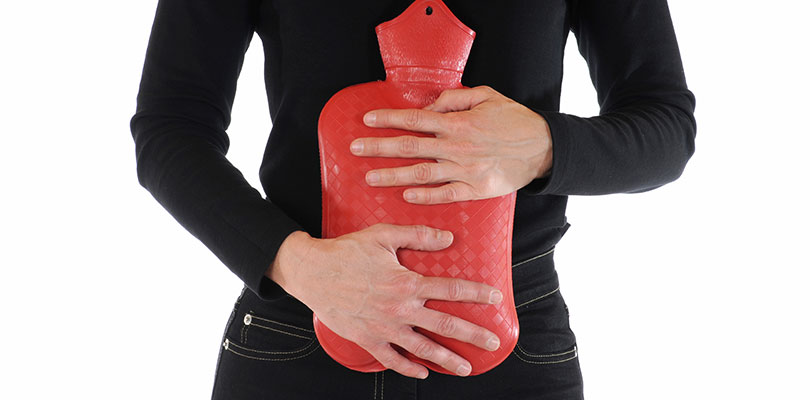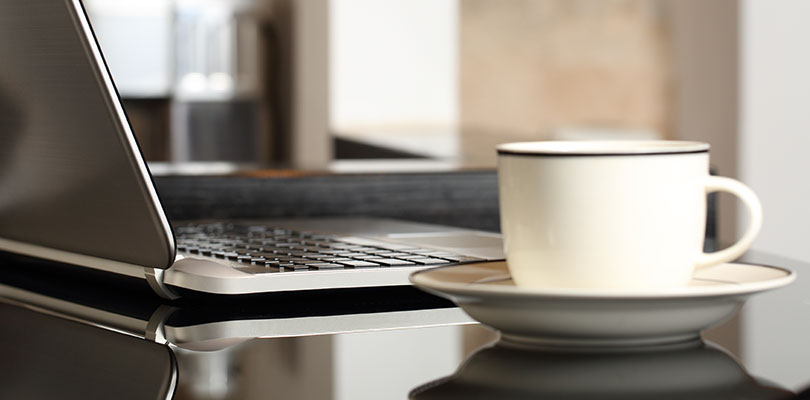
Photo Credit: g-stockstudio / istockphoto.com
How to Use Food, Breath and Natural Remedies to Calm Your Body
When a rumble in your stomach turns into a painful cramp, you know your irritable bowel syndrome (IBS) is about to take over. Your body tenses, your worries spike, and your mind races to thoughts of the nearest bathroom. Whether you’re in your own home or in the middle of an event, it’s never fun to deal with a flare-up, and depending on your next steps, it can get worse before it gets better.
Since each body is different, it can be tough to know how best to proceed during an IBS flare-up, but there are a few methods to help calm your intestines, soothe your stomach, and make the pain much more manageable. These eight tips will help your body and mind get through the attack more comfortably.
Calm Your Mind
You may not experience the very same symptoms or triggers as the next person, but all IBS sufferers do share one common enemy — stress. Your first priority should be to cut down stressful situations; while you may not be able to get rid of all the stress in your life, you can certainly ease its impact by taking charge of your thoughts and emotions.
The calmer your mind, the calmer your symptoms, so learn techniques to soothe yourself and snuff out your worries. It’s natural to fear the worst when you feel that first sharp cramp, but it’s important to tell yourself to slow down and trust that your body will hold it in for at least a few minutes.
The idea is to give yourself time and mental space to control your symptoms while you find a bathroom — remember that panicking will make physical processes much more difficult to control.

Photo Credit: artemisphoto / istockphoto.com
Use Your Breath
The way you breathe can have profound effects on how the rest of your body behaves. Deep, slow breaths actually activate a sense of calm and counteract the stress response that’s targeting your digestive tract.
Effective deep breathing involves a few elements:
- Drawing your breath into your belly (it should swell with every inhalation)
- Keeping your shoulders and chest relaxed (your upper chest shouldn’t move much when you breathe)
- Equal length of inhaling and exhaling (breathe in to the count of three, then out to the same count)
Focus on your breath, letting your thoughts drift off, and your muscles will begin to release before you know it. If you can practice your breathing exercises before your IBS acts up, you’ll know precisely how to calm your stomach, and relief will come more quickly.

Photo Credit: PeJo29 / istockphoto.com
Treat Pain With Heat
IBS isn’t only embarrassing, it’s often incredibly painful, too. Over-the-counter pain relievers can be pretty hard on your already upset stomach, so go the gentle route and treat the discomfort with a bit of heat therapy.
Applying something warm directly to your belly is both psychologically soothing and physically soothing. Try a hot water bottle — a classic treatment for a sore tummy, but one that has stood the test of time. You could also heat your body from the inside with a mug of warm tea (try mint for extra stomach-soothing impact), or hot water with lemon and honey.

Photo Credit: olgakr / istockphoto.com
Eat Smart
An agonizing episode of constipation will call for different measures than a sudden attack of diarrhea. You may not feel like eating in either case, but consuming the right foods could ease your discomfort.
If you’re dealing with diarrhea, plain starches can add bulk and help slow digestion. Bananas and white rice are the classic choices, but plain white potatoes or toast (if you haven’t gone gluten-free) can do the trick, too.
As for constipation, probiotics (often found in yogurt) are your best bet to restore the balance of flora and helpful bacteria in your gut. Fennel tea can also ease the pressure and get things moving.
If you live with IBS you should consider making some lifestyle changes and home remedies to making living with IBS easier.

Photo Credit: AntonioGuillem / istockphoto.com
Cut out Caffeine
Your morning cup of coffee could be making your tummy troubles a lot worse. In fact, caffeine is known to cause painful spasms and diarrhea in people who don’t have IBS, so when your symptoms are flaring up, caffeine is the last thing you’ll want to bring into the picture.
Coffee is quite possibly the worst beverage of all: not only does it pack a lot of caffeine into each cup, but the enzymes in coffee beans are also stomach irritants. Since caffeine also raises your heart rate and can induce anxiety, it’s best to eliminate it altogether – which means cutting out caffeinated teas, soda and chocolate along with coffee.

Photo Credit: KatarzynaBialasiewicz / istockphoto.com
Make Use of Medication
Although medication doesn’t work for everybody, it can be worth a try when other management strategies aren’t bringing enough relief. The most common classes of drugs to use for IBS are antispasmodics, antidepressants and antidiarrheal medications.
An antispasmodic like hyoscine can relax the smooth muscle of your colon, which should ease cramping and fight off spasms. Antidepressants are most commonly used to help with the abdominal pain with IBS, but only about 25 percent of patients report improvement.
Antidiarrheal drugs can be important tools when diarrhea is so bad that your health is in jeopardy, but since they can bring rather significant side effects, they should only be taken under close supervision.

Photo Credit: igorr1 / istockphoto.com
Try Peppermint
Wherever you stand on “natural” medicine, this common, tasty plant has an undeniable effect on the stomach. Peppermint is great at calming the smooth intestinal muscles, which will reduce spasms and decrease pain.
Top quality peppermint tea can be immediately soothing — the heat and mint team up for a comforting effect — but concentrated oil of the plant will likely bring more significant results. Experts suggest taking a 0.2 ml gel capsule two times a day, and sticking with it for a while (it can take up to a week to experience a real change). However, steer clear if you’re prone to heartburn, since peppermint can make acid reflux worse.

Photo Credit: Jacob Ammentorp Lund / istockphoto.com
Distract Yourself
There’s a powerful connection between the mind and body, so just as emotional stress can make your IBS worse, putting your mind to another task can soften your symptoms and reduce your perception of the pain.
You may not want to stray too far from the bathroom when your digestive system isn’t cooperating, but there’s plenty you can do around the house to keep your mind off your IBS. Yoga is a great hobby to take up: you’ll reduce your stress, relax your muscles, and concentrate on a simple, soothing set of movements all at once. There are so many different styles of yoga to practice, so try one that appeals to your exercise personality and flexibility.
Once you get through an IBS flare, it’s natural to worry that another might be on the horizon. You may be anxious just thinking about the possibility — and that alone can be enough to bring on an attack.
Instead of letting your worries overcome you, focus on staying calm and noticing the early warning signs, practicing your deep breathing and relaxation exercises to bring the situation under control.
Follow these tips for stress relief to prevent and manage anxiety and stress while taking steps to prevent and manage your IBS symptoms.








